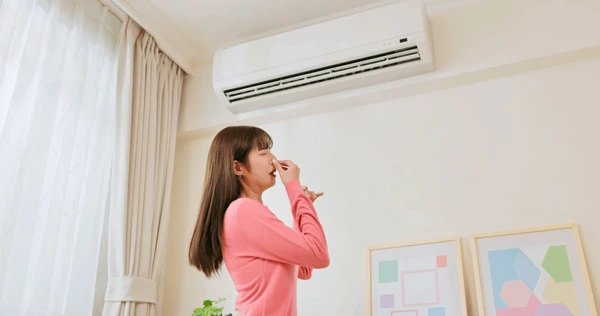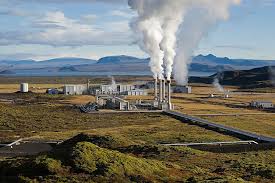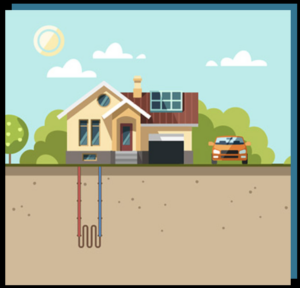Few things are as refreshing as flipping on your air conditioner on a hot day — until you’re hit with an unpleasant odor. If your AC smells at startup, you’re not alone. Many homeowners experience strange, musty, or even foul odors when their cooling system first kicks on. While it may seem like just an annoyance, bad smells can actually be a warning sign of underlying issues that need attention.
In this in-depth guide, we’ll break down the common causes of AC smells at startup, how to identify what type of odor you’re dealing with, and the best solutions to restore fresh, clean airflow in your home.
Why Does My AC Smell When It Starts?
Air conditioners are designed to deliver cool, clean air. But when odors develop, they’re usually caused by a buildup of contaminants, poor drainage, or mechanical issues. Your HVAC system circulates air throughout the home, so if something is off inside the unit or ducts, you’ll smell it almost immediately.
The key is understanding what the smell indicates. Some odors are relatively harmless and easy to fix, while others may require professional repair.

The Connection Between AC Smells and Indoor Air Quality
When your AC smells at startup, it isn’t just a comfort issue — it’s a direct reflection of your home’s indoor air quality. Poor air circulation, dirty filters, or microbial growth inside the system can all contribute to bad odors. Left untreated, these problems don’t just make your house smell bad, they can also:
- Trigger allergies or asthma.
- Circulate dust, pollen, and bacteria.
- Reduce overall sleep and comfort.
- Lead to higher energy bills from an overworked system.
This is why identifying AC unit odor causes quickly is so important.
The Most Common Reasons Your AC Smells Bad at Startup
Let’s break down the most frequent air conditioner smell solutions by identifying the source of the odor.
1. Musty or Moldy Smell
If you notice a musty AC smell, it’s often a sign of mold or mildew growth inside the unit. This usually occurs in the evaporator coil or drip pan, where moisture collects.
Causes:
- Clogged condensate drain line.
- Excess humidity in the home.
- Dirty air filters.
Solutions:
- Clean or replace air filters.
- Clear the drain line to prevent standing water.
- Schedule professional coil cleaning.
- Consider installing a dehumidifier for long-term prevention.
2. Dirty Sock Syndrome
Believe it or not, HVAC pros use this term to describe the sour odor that resembles sweaty gym socks. It’s a direct result of microbial growth on your evaporator coil.
Causes:
- Warm, moist conditions inside the system.
- Accumulation of dust and organic matter.
Solutions:
- Deep clean of the evaporator coil.
- Use UV lights inside your HVAC system to kill bacteria.
- Regular filter changes.
3. Rotten Egg or Sulfur Smell
A bad odor from air conditioner that smells like rotten eggs can be dangerous. It often indicates a natural gas leak near your HVAC system.
Causes:
- Gas line leak.
- Dead animal in ducts (in less serious cases).
Solutions:
- If you suspect a gas leak, turn off your system and call your utility company immediately.
- Have ducts professionally inspected and cleaned if rodents or pests are suspected.

4. Electrical or Burning Smell
If your AC smells at startup like something is burning, don’t ignore it. This may indicate an electrical problem.
Causes:
- Overheated motor.
- Worn fan belt.
- Electrical wiring issues.
- Dust burning off after long disuse.
Solutions:
- Shut off the unit if the smell is strong or persistent.
- Call a licensed HVAC technician for inspection.
- If the system has been idle all winter, a faint smell may disappear after a few cycles.
5. Chemical or Exhaust Fumes
Air conditioners don’t run on fuel, so if you notice chemical or exhaust-like odors, it could point to a refrigerant leak.
Causes:
- Refrigerant escaping from coils or lines.
- Contaminants inside ductwork.
Solutions:
- Have a technician check refrigerant levels and repair leaks.
- Never attempt to fix refrigerant leaks yourself — refrigerants require EPA-certified handling.
6. Sewage-Like Smell
A foul odor that resembles sewage may not actually come from your AC, but your system can spread the smell if your plumbing has a leak near air ducts.
Causes:
- Backed-up sewer lines.
- Broken vent pipe near ductwork.
Solutions:
- Schedule plumbing inspection immediately.
- Ensure ducts are sealed to prevent odor spread.
7. Pet or Dead Animal Smells
Sometimes pests or small animals crawl into ductwork seeking warmth and shelter. If they die inside, you’ll notice a strong, unpleasant odor when your AC unit odor causes airflow to spread it.
Solutions:
- Have ducts inspected and cleaned.
- Install pest screens or sealing to prevent future entry.
How to Prevent Bad AC Smells in the Future
To keep your system fresh and healthy, follow these maintenance practices:
- Change filters every 1–3 months.
- Schedule seasonal HVAC tune-ups.
- Keep drain pans and lines clear.
- Seal and insulate ductwork.
- Consider air purifiers or UV lights to reduce microbial growth.
- Maintain proper humidity levels in your home.
Prevention is always easier — and less costly — than dealing with strong odors later.
Why Professional Maintenance Matters
While DIY cleaning helps, some issues require professional attention. Technicians have specialized tools to clean coils, detect leaks, and repair electrical components safely.
At Envirotech Geo, we specialize in advanced HVAC solutions, including geothermal systems that minimize common odor issues. Geothermal units run cleaner, quieter, and more efficiently, helping you avoid many of the AC smells at startup problems traditional systems face.
Geothermal HVAC: A Fresh Alternative
If you’re tired of fighting recurring HVAC odors, upgrading to geothermal can be a long-term solution. Benefits include:
- Cleaner operation (no combustion fumes).
- Reduced humidity levels indoors.
- Ultra-quiet performance (no noisy startups).
- Consistent, odor-free comfort year-round.
Final Thoughts: Don’t Ignore AC Smells at Startup
When your AC smells at startup, it’s more than just an inconvenience — it’s a warning sign. From musty mildew growth to serious issues like gas leaks, each odor has a story to tell. By identifying the source and taking timely action, you can keep your home safe, your air fresh, and your system running efficiently.If odors keep returning or you’re ready for a cleaner, greener solution, contact Envirotech Geo today to explore advanced HVAC options like geothermal. With expert service and sustainable technology, we’ll help you breathe easier — and enjoy a fresher, healthier home.
FAQs About AC Smells at Startup
1. Is it normal for AC to smell the first time it runs?
Yes, a faint dusty smell may occur after long disuse, but strong or persistent odors indicate deeper problems.
2. Why does my AC smell musty every time it starts?
This usually points to mold or mildew growth in the system, often due to excess moisture or clogged drains.
3. Can AC smells make you sick?
Yes. Mold, gas leaks, or chemical odors from refrigerants can affect health and should be addressed immediately.
4. How can I tell if my AC smell is dangerous?
Rotten egg, chemical, or burning odors should never be ignored — turn off your system and call a professional right away.
5. Will regular maintenance stop bad AC smells?
In most cases, yes. Routine inspections, cleanings, and filter replacements prevent the buildup of contaminants.


